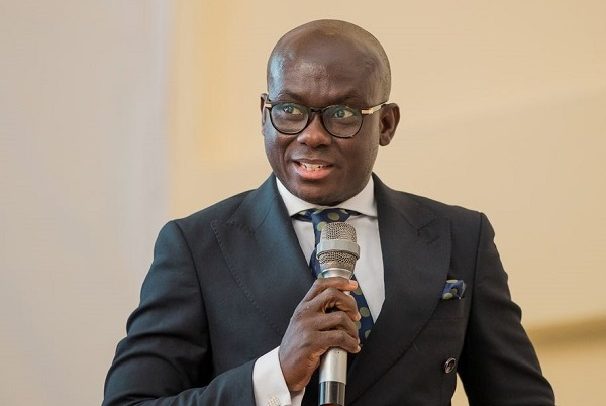Godfred Yeboah Dame
Attorney General and Minister for Justice, Godfred Yeboah Dame has proposed the use of solar energy in Senior High Schools (SHS) across the country as a cheaper and reliable alternative in the face of power challenges facing some schools.
According to him, it has become imperative for the nation to promote and deploy renewable energy efficiency measures in Ghanaian high schools in order to avoid the undesirable situations where schools have their power supply cut off for non-payment of electricity bills, and improve the learning environment of the schools.
“Solar energy, in my respectful view, is the most viable form of renewable energy the nation can rely on. As is clear, solar energy is derived from a natural source that is replenished at a far higher rate than it is consumed. Indeed, together with wind, sunlight is a source of energy that is constantly being replenished.”
Mr. Dame was speaking at the 114th Speech and Prize-Giving Day of Adisadel College in Cape Coast, Central Region, on Saturday, March 9, 2024.
The Attorney General’s proposal comes at a time where globally, there is an emerging energy crisis and energy markets are tightening since 2021 for a variety of factors, including the extraordinarily rapid economic rebound following the Covid-19 pandemic.
The price of natural gas reached record highs, and so did electricity in some markets while oil prices hit their highest level since 2008.
The proposal also resonates with the facts that some senior high schools have had their power supply cut due to indebtedness, with Accra Academy being the latest to have it power supply cut on February 19, 2024.
Mr. Dame said the persistence of energy challenges has made it imperative that Ghana embarks on what is described as ‘energy transition’ which is now considered a global priority as the world ramps up efforts to achieve climate goals.
Free SHS Viability
He said Secondary education is critical to the growth, development and the future of the nation as it results in a more enlightened and empowered society.
“That is why the Free SHS Policy introduced by the Government of President Nana Akufo-Addo is a serious game changer for this country’s future. However, the supply of reliable, efficient and affordable energy is a necessity to the sustenance of the Free SHS programme in the country,” Mr. Dame observed.
He continued that the adoption of the Free SHS policy by the people of Ghana, with education made accessible to all throughout Ghana, undoubtedly implies an increase in the energy demands of senior high schools in Ghana.
“By dint of Ghana’s privileged location on the planet, we are endowed with solar energy as a country. We cannot miss out on the opportunity for sunlight to make a significant contribution to the energy mix by ensuring that direct solar energy is available for every individual. Every senior high school, especially the boarding institutions, ought to make solar energy their main source of energy,” the Attorney General said.
He also indicated that the benefits of deploying solar energy to satisfy the immense energy requirements of secondary schools are many but the most important advantage is that it creates far lower emissions than burning fossil fuel derived from non-renewable sources like coal, oil and gas.
Mr. Dame said the funds saved from electricity bills as a result of the installation of sustainable solar energy will be utilised for other productive ventures by the schools.
He said student will also get a safer and healthier learning environment which will assist in the attainment of academic potential and bridge the gap between less endowed schools and the relatively privileged ones.
He added that solar energy has the potential to create more jobs for people. Renewable energy though cheaper in most countries, has been proven to generate three times more jobs than fossil fuels.
Challenge
The Attorney General, however, observed that even though solar energy is much cheaper than other sources of energy and ultimately, the long-term financial wisdom in resorting to it will be realised by all, the initial installation may entail some cost to institutions.
“In order to address this, I recommend that for less privileged institutions, there must be cooperation in the nature of public-private partnership whereby the schools collaborate with relevant stakeholders, especially the private sector.”
He added that, “For other institutions with a strong old boy/old girl tradition, this is the kind of project that the old students association should derive satisfaction from pursuing.”
ADISCO Impact
Mr. Dame highlighted the diverse roles former students of the school, including himself have and continue to play in the development of the school and to national development.
He, however, observed that in recent times, the ‘can do’ spirit and sense of self-sacrifice doctrine instilled in former students, “seem to be dwindling among the Santaclausian fraternity with the consequence that many year groups fail to accomplish their projects, a situation accounting for the phenomenon of many uncompleted projects dotted around the campus.”
This, he said also contributes to the deplorable sanitary conditions in which current crop of students live to study.
Mr. Dame, therefore, called on former students worldwide to dig deep into their pockets, in order to contribute generously towards boosting the physical infrastructure of the campus.
“I would admit however that, from experience, sometimes lack of proper coordination of the activities of old boys inhibits the mobilization of old boys efficiently towards the running of the school,” he added.
BY Gibril Abdul Razak

